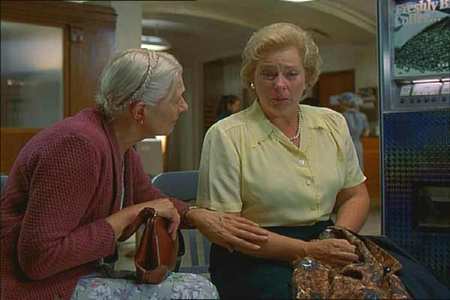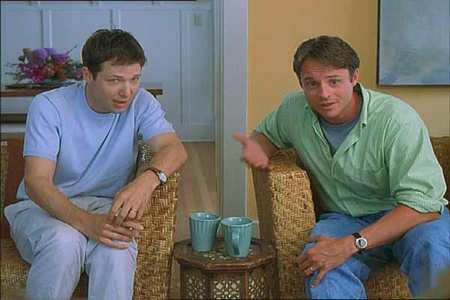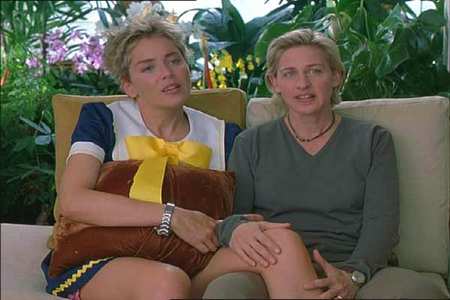Review of If These Walls Could Talk 2
Introduction
‘if these walls could talk 2’ follows the story of three generations of women each living in the same house over a 40 year period as they struggle with the social, legal, physical, personal and political restrictions of homosexuality. Okay, so I’m not exactly the target audience for a movie about American lesbianism in post-war America but hey, propaganda is propaganda regardless of who is watching it.

Video
Pretty good. it’s a TV movie so it’s a 4:3 ratio, but its free of any obvious artifacting.

Audio
Quite good, the tunes are typical acoustic chiming lesbian-movie-of-the-week type stuff (Melissa Etheridge, Moby, Dido, etc) but the sound quality in general is okay, but hardly groundbreaking.

Features
Rubbish as ever. A trailer, some behind the scenes notes and cast bios. The menu features some ambient music, but we don’t even get the advertised photo gallery. Is there no justice?!?!

Conclusion
We start in ‘1961’ with the best, and really only decent segment. Still suffering from the social repression and intolerant denial left-over from McCarthyism in the ‘50s, Venessa Redgrave and Marian Seldes struggle with their relationship, at least, they do for about 8 minutes before Seldes falls off the ladder and croaks. The rest of the story is rather mechanical and predictable, but Redgrave’s performance is brilliant: powerful and serene with the undercurrent of profound sadness living in every subtle gesture as everyone around her manages to collectively misunderstand and under-appreciate their relationship. Elizabeth Perkins is good too as a cruel, polite, self-obsessed distant relative to the deceased.
In ‘1972’, Linda (Michelle Williams) a lesbian feminist student who lives in a commune with a bunch of other lesbian feminist students visits a local gay bar with said commune, including ex-squeeze Natasha Lyonne. She quickly attracts the attention of a local biker chick (Chloe Sevigny) who fancies some for herself. And some she gets, to the disdain of her rather pompous, self-actualizing peers who sneer at the thought of a girl dressed as an evil, tie-wearing male on the premises. Neither Sevigny nor Williams appear entirely comfortable either together or as their characters, the situations and scenarios are contrived and badly structured, and the view of these half-assed sorority babes on show is rose-tinted to say the least.
‘2000’ is basically an episode of Ellen DeGeneres’ TV show shot with the soft-focus sitcom glossyness of her partner Anne Heche. DeGeneres bitches and whines in her usual neurotic, west-coast, post-therapy wannabe Woody Allen sort of way and Stone takes Heche’s place, wanders around in a dressing gown , bakes cookies (not to mentions acts cookie) and offers occasional comic relief. They mumble around in this limply structured chapter, talking, screwing and try to get artificially ‘stocked’ with store-bought spunk. Absolutely no drama to speak of.
Countless problems here: separately and inclusively, the film(s) are packages, pandering and utterly terrified to scandalize us. The minutiae of lesbian living clearly not the territory of a film more interested in sweeping gestures and jabs at Conservative intolerance (which pretty much amounts to guys in suits shaking their heads in dismay) and tokenistic characters. The performances are wildly variable, DeGeneres and Stone are OK and Redgrave is wonderful, but most of the other performances feel like rather disturbing exercises in ‘slumming’ with the marginalised idea of lesbianism. Also, there’s a certain tastelessness to the film’s obsessive, sterilized tastefulness: which indulges in a series of soft-core sex scenes (naturally all of the women concerned have perfect bodies, figures and are groomed to perfection) while at the same time managing to completely fail to establish a dynamic social context or complex characters. That said, its heart is in the right place and there has been enough victimization of women, particularly minority groups of women, in Hollywood in the past to warrant a bit of propagandistic one-sidedness in this film. That said, its depressing that a film that campaigns against female stereotypes buys so wholesale into the cliché of the chick flick: big on emotion, love, sadness, laughs and human interaction, short of drama, structure, depth and completeness.
Your Opinions and Comments
Be the first to post a comment!